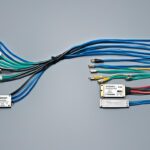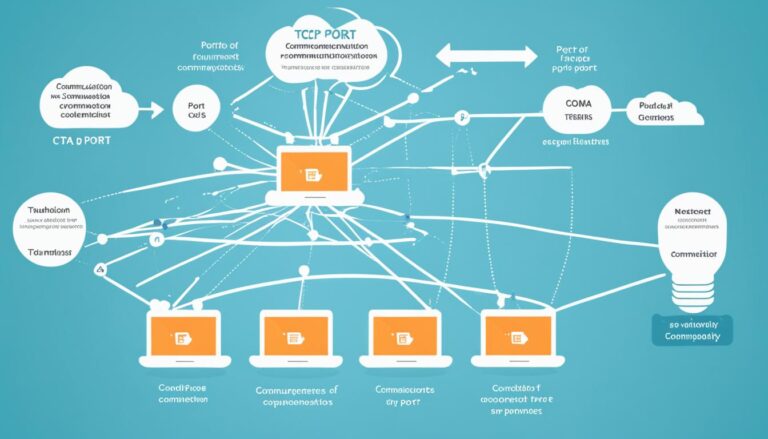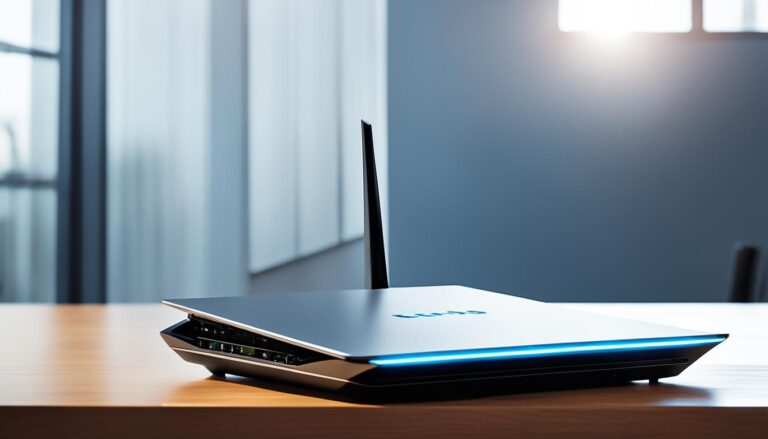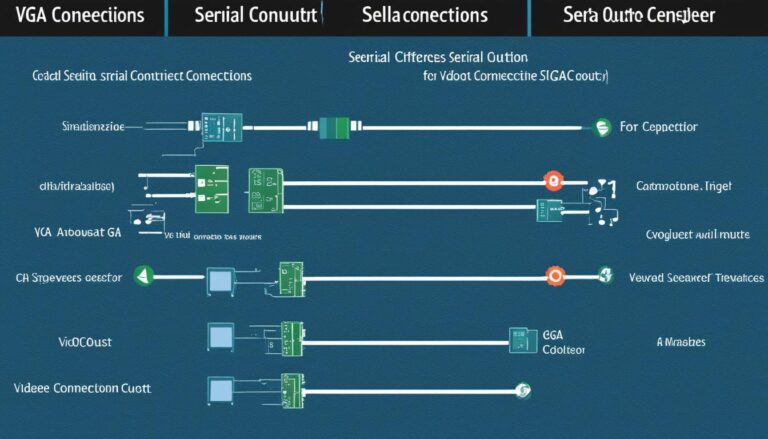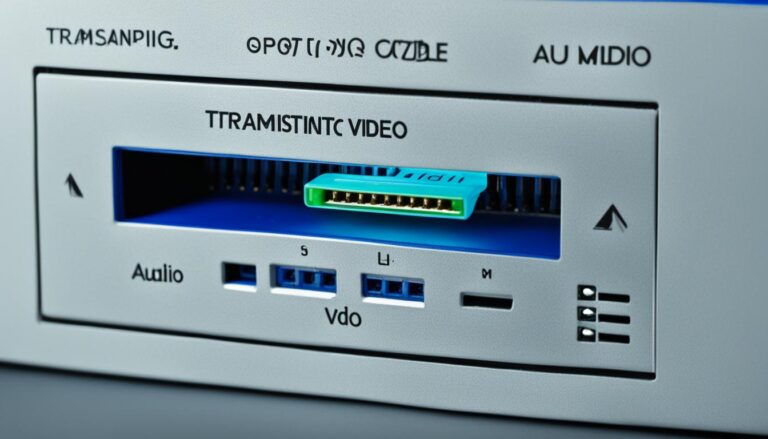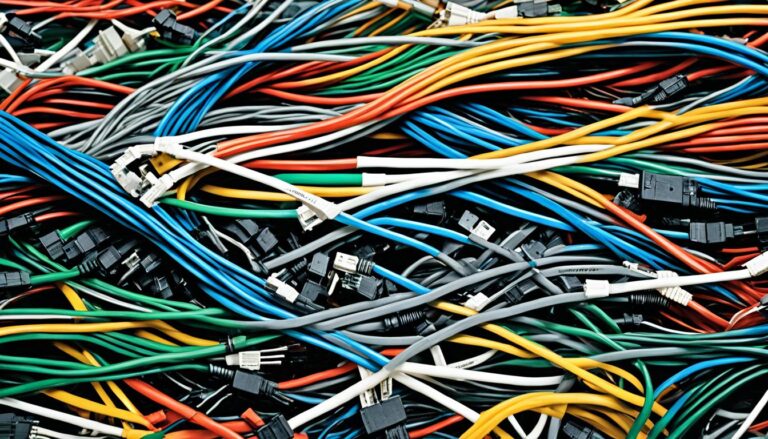A proxy port number is a special number that comes after an IP address. It helps different devices talk to each other over the internet. This number is key for online safety. It lets you surf the web without giving away who you are and keeps your data safe. In this article, we’re going to look at what a proxy port is and why it’s important for proxy servers.
Understanding Internet Ports and IP Addresses
Before we dive into proxy ports, we need to understand internet ports and IP addresses. An IP address is like a name tag for a web server. It lets devices talk to each other online. Ports make sure emails, web browsing, and FTP data transfers work properly.
Each port has a special number. This number tells us what the port is for. People agreed on these numbers so everything works smoothly together. This way, devices can find and use the services web servers offer.
“Port numbers serve as standardized gateways, facilitating smooth communication and data transfer over the internet.”
But, with proxy servers, things are a bit different. They use special port numbers. This helps keep the user’s proxy IP hidden. Using these unique ports adds a layer of security and keeps your data private.
Even though proxies use special ports, they still match the internet’s rules. For example, HTTP proxies often use ports 80, 8080, and 8008. These are all for web browsing. HTTPS proxies use port 443 for secure online chatting.
To sum up, it’s key to understand internet ports and IP addresses to get how proxy ports work. While proxies might not stick to the usual port numbers, they do this to keep users anonymous and safe online.
Example table:
| Port Number | Protocol | Common Use |
|---|---|---|
| 80 | HTTP | Web Browsing |
| 8080 | HTTP | Web Browsing (Alternative) |
| 8008 | HTTP | Web Browsing (Alternative) |
| 443 | HTTPS | Secure Web Communication |
Note: The table above showcases common port numbers and their associated protocols and uses, providing a glimpse into the standardized numbering conventions.
Types of Proxy Ports
Proxy servers use different proxy ports depending on the protocols supported. Let’s look at the types:
HTTP Proxies
HTTP proxies help with web scraping and rerouting traffic in public Wi-Fi. They use ports 80, 8080, and 8008. This makes data easy to get and adjust.
HTTPS Proxies
HTTPS proxies ensure a secure data channel. They’re key for keeping data safe and secret. Port 443 is usually their choice for secure info sharing.
SOCKS Proxies
SOCKS proxies are unique. They don’t stick to set port numbers. This flexibility lets users route traffic freely. SOCKS proxies suit those needing adaptable options.
Squid Proxy
A Squid proxy focuses on caching and forwarding. It links to port 3128. This helps in storing content well and boosts network efficiency.
Knowing about different proxy ports helps choose the right one for your needs. Using HTTP, HTTPS, SOCKS, and Squid proxies can increase online safety and improve browsing.
Continue reading to learn more about key points in using proxy port numbers.
Proxy Port Number Considerations
Thousands of ports are out there, yet some are not open for proxy due to security reasons. Proxy servers can control the availability of these ports. Each proxy provider has rules on how ports are assigned within their proxy pools.
Shutting down ports reduces the risk of illegal activities. For example, port 25 is not used for SMTP email to stop spam. This move helps keep users safe.
“Port 25, which is closed for SMTP email handling, helps prevent spam and unauthorized mail relaying.”
Closing ports between 6881 and 6889 stops illegal torrenting. This action safeguards the network from legal troubles.
“Ports from 6881 to 6889 are often closed to prevent torrenting.”
Proxy services have a duty to use their powers wisely. They block certain activities to keep the internet safe.
This is a preview of how proxies manage their ports:
| Proxy Provider | Port Numbering |
|---|---|
| ProxyNet | Ports 8000-8200 |
| SecureProxy | Ports 5000-6000 |
| GlobalProxy | Ports 8000-9000 |
These cases show how port numbers are set to balance security and access.
Knowing about port rules helps choose the right proxy and keep your browsing safe.
Finding Proxy Server Address and Port
Looking for ways to use proxies online? You’ll need the proxy server address and port number first. With these details, using a proxy becomes simple. MyIP.com is a handy tool for finding this info easily.
MyIP.com is known for being reliable. It shows the proxy IP and port settings right in your browser. This means you don’t have to mess with difficult setups. You’ll quickly have what you need to connect to the proxy server.
The proxy server address is an IP address plus a port number. You need this blend to link to the proxy and direct your web activities through it. Remember, accessing some proxies might ask for a password.
Grasping your proxy address and port numbers is key for effective proxy use. With this knowledge, you can set up various apps and tools. This allows anonymous and safe web tasks.
To wrap up, finding the proxy server address and port is crucial for proxy use. Sites like MyIP.com make it easy and give precise info. Knowing your proxy details opens up many possibilities for safe and private online activities.
Conclusion
Proxy port numbers play a big part in how proxy servers and internet safety work. It’s key to pick a proxy provider you can trust. Choosing a reputable one when buying proxies is important.
A good proxy provider lets you control your proxy setup fully. This means you can change settings to meet your needs. An account manager can help you understand your proxy pool well, including the IPs and ports.
It’s also vital to have access to help any time, every day. If you face problems, a dependable partner will be there quickly to help. They keep your proxy services running well with timely support.
FAQ
What is a proxy port number?
A proxy port number follows an IP address. It helps devices communicate over the internet.
How is a proxy port number used?
Proxy port numbers are key for internet safety. They support anonymous web use and keep data safe.
What is the significance of proxy ports in the realm of proxy servers?
Proxy ports are vital for proxy server chats. They manage traffic and keep users anonymous.
What are internet ports and IP addresses?
Internet ports serve various roles like email, FTP data moves, and web browsing. IP addresses point to web servers.
Are there standardized numbering conventions for internet ports?
Yes, application-based standards exist for port numbers. Yet, for secrecy, proxy services often change these norms.
What are the different types of proxy ports?
The types include HTTP proxies (ports 80, 8080, 8008) and HTTPS proxies (port 443). SOCKS proxies don’t have fixed ports. Squid proxy uses port 3128.
Can some proxy ports be closed for certain uses?
Certain proxy ports might be shut down. This is due to security needs or to stop illegal actions.
How can I find the proxy server address and port number?
To discover your proxy IP and port, use a website like MyIP.com. It shows the settings in your browser.
What else do I need to consider when it comes to proxy port numbers?
Remember, proxy providers follow their own port numbering rules. These reflect their proxy pool arrangements.





